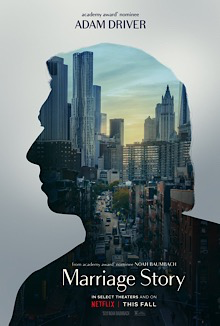Marriage Story


Marriage Story
Release Date: December 6, 2019
Runtime: 136 minutes
Rating: R
Studio: Netflix
Director: Noah Baumbach
Cast: Scarlett Johansson; Adam Driver; Laura Dern; Alan Alda; Ray Liotta; Julie Hagerty; Merritt Wever; Azhy Robertson
**Reviewed at the 57th New York Film Festival – October 11, 2019**
A relationship ending, no matter when or how, is a traumatic experience. Feelings are hurt, things are said in the heat of the moment that are not necessarily meant, accusations are recklessly thrown about. Yet, ironically, the termination of a relationship seems to be, at least somewhat, easier to handle if there is true fault on one side – gross infidelity, abuse, neglect – than if both parties are trying to end things amicably. Sometimes people just fall out of romantic love with each other with no begrudging the other person, no loss of respect or mutual fondness. When relationships of this sort end, it’s almost harder because neither person wants to further wound the other in what is inherently a wounding process.
This is the case with Noah Baumbach’s brilliant and scarring examination of a divorce, Marriage Story. Adam Driver and Scarlett Johansson (both performing at career bests) play Charlie and Nicole, two good people married for years with a young son, Henry (Azhy Robertson). He is a New York-based theater director and she is his lead actress: the romance writes itself. As Charlie and Nicole explain in introductory voice-overs, both have tremendous admiration for each other and all of their accompanying quirks: she’s a walking ray of sunshine in a cruel city; he’s energy conscious and always turning off lights, whether people need them on or not. Both are fanatically dedicated to their young son and, for his part, Henry is a well adjusted and smart 8 year old.
But it didn’t work out. She has longed to move back to her hometown of Los Angeles, at least for a little while, and he is determined to stay in New York City where his theater is. She accuses him of being too self-involved and, conversely, he accuses her of fabricating her unhappiness. Underneath it all, however, each has profound love and respect for the other, which makes it all the more difficult once lawyers (Laura Dern, Alan Alda, and Ray Liotta, all spectacular) get involved. Baumbach’s script has built Charlie and Nicole’s relationship up as so decent and recognizable and his characters as so likeable and human (Baumbach highlights such universal humanities as food being stuck in one’s teeth and lifting the toilet seat up) that their ordeal is genuinely heartbreaking for the audience to watch. Charlie and Nicole are not broadly drawn caricatures who the audience is invited to simply view from a distance, i.e. from the comfort of their theater seats. These are flesh and blood people: we know them, perhaps are them. The humanity in the characters that Baumbach paints and the extremely difficult circumstances in which they find themselves makes for an extraordinarily uncomfortable trial for the audience to endure. It’s like watching your best friend go through a particularly emotional heartbreak. And it’s not like you can just jump into the screen and take Charlie for a drink to drown his sorrows or give Nicole a shoulder to cry on. This is gut-wrenching stuff.
Johansson and Driver are nothing short of magnetic. Both have scenes – separately and together – that reinforce what tremendous artists they are. Charlie and Nicole are tough roles to play and each actor finely and breathtakingly captures the emotional rollercoaster each is on: the centerpiece scene between Charie and Nicole is a master class in emotional purging. I have always liked Scarlett Johansson but Adam Driver is, I can confidently say, one of (if not, the) best actors of his generation. He conveys such emotional truth in all of the characters that I’ve seen him play and continues to make smart acting choices. Driver is an actor in total control of his craft: I will watch him in anything! Dern and Liotta (in showy roles), as well as Alda, Merritt Weaver (fresh off of her superb performance in Netflix’s Unbelievable), Julie Hagerty, and young Robertson all provide fantastic support.
Perhaps because this is a simple movie with a simple story, Baumbach provides himself with room to dig deep and expose the ugly side of human nature that can unfortunately surface in times of extreme emotional distress. Yet through the peerless performances of his actors who steer the audience to root for them despite the hurt they’re inadvertently causing each other, Marriage Story emerges as the best kind of hard-to-watch movie.

1 Comment
Quite a review. Something I might be interested in seeing.